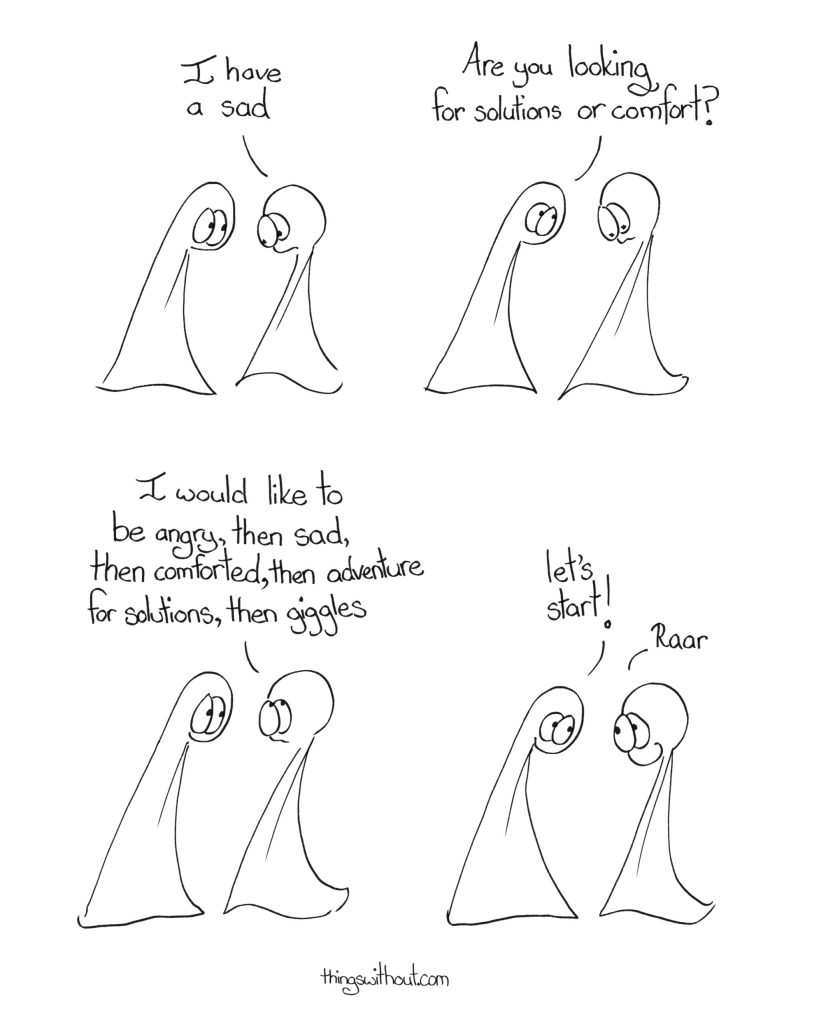We Need Care, Not Advice

What Hurting People Need (Part 2)
We Need Care, Not Advice
This is not new news. Hurting people have been saying this for years.
Relationship experts talk about it, marriage counsellors talk about it, everybody’s Auntie on Facebook talks about it. Heck, there are even memes and webcomics about it. Hurting people want comfort, care, and support, not advice.
The problem with advice is not the advice itself. It’s how it makes someone feel.
When we “solve” someone’s problem in 30 seconds flat, we oversimplify a complicated situation. If their problem really was solvable by canned advice from Dr. Google, they would have done it already. Quick answers make a hurting person feel stupid, judged, and not heard. It shuts down further conversation where they would probably explain their situation more fully.
Assume that there is much more to the story, and you’ll always be right.
I’m not sure how much more prevalent this message could be, and yet, every time I share something I’m struggling with (to anyone who is not in my inner circle of awesome), 90% of the responses I get are:
- “Have you tried…?”
- “You know what you should do?”
- “My mother/sister/nephew/6th-cousin-twice-removed had that problem. All they did was…”
Now, I’m going to give people the benefit of the doubt here.
Last week I talked about how, when I hear bad news, I first freeze up, and then get an adrenaline rush to respond and help. I don’t think I’m alone.
I don’t think the majority of advice-givers do it on purpose. I think it comes from a good place of caring, and when their knee-jerk of adrenaline kicks in, these people care enough to want to solve the problem. Lighten the load. Take the pain away.
I think most people don’t minimize another person’s pain on purpose. (We all know that one person with the inflated sense of importance that just loves having all the answers.) So then how do they–how do I–stop doing it?
Well, it just so happens that I have some great advice!!
(I kid, I kid…)
The truth is, I still make this mistake. I particularly struggle when the plea for emotional support is disguised as an actual ask for advice.
What?! Even when someone asks for advice, they may not want advice?!
Yup. I know because I’m guilty of it. And guilty of being the advice-giver in that situation.
See, some of us are not good with emotions. Some of us have been taught our whole lives that emotions and pain make us weak, silly, and unfit for the task at hand. So we make emotions sound more logical.
Some of us say, “What do you take? I can’t find the right medication.” instead of, “I’m in so much pain all the time. I’m ready to dissolve into a puddle of goo. You’re the only other person I know with this condition. Please tell me you understand.”
Some of us say, “Got any advice for fixing a toddler that wrecks everything and never listens?” instead of “I’m exhausted. And worried that I’m a bad Mom. And afraid that no one else has this problem. Please, somebody, tell me you understand.”
It’s not always easy, but I have been training myself to look for the emotion under the words. That is usually the part that needs addressing.
So you’re saying that I can never give advice? Not even good advice from personal experience that could really really help?
No. Advice has a time and a place. It’s just not first place.
First address the emotional need, then (if need-be) address the practical need.
Sometimes the emotional need is the only one that actually needs addressing. Sometimes people know how to fix their problem. They just need emotional support. A morale boost before doing battle.
And sometimes the emotional need is the only need you can help with.
Some problems require trained professional help. And that’s ok. Let the professional therapists/financial planners/parenting coaches/medical technicians/etc… do their jobs. You do your job as a friend. Take care of the emotions.
There is no quick-fix for changing your response to others. It–like most things in life–is a matter of practice, practice, practice. But I promise, making the move away from instant advice, and toward instant care and concern is worth it.
Yes, you will make mistakes, and yes, things will get awkward once and a while.
But try it anyway.
Isn’t a few awkward and imperfect interactions better than a lifetime of hurtful ones?
Try it. It might change a life.
And if you’re lucky, it’ll change two.
What is the worst/most off-base/most funny advice you’ve ever received?
© 2021 Ashley Lilley – First time commenting? Please read my Comment Policy.



The worst advice I received was that the reason I still have pain and that I am not healed is due to sin.
Well this same person has had some health issues now.
I wonder if I should ask them.. Never mind.
LikeLike
It’s so odd that some people can’t have compassion for others unless they are in the same boat. I always wondered at the lack of imagination/empathy.
LikeLike
This person was in the same boat(mostly), but because they were told she would never walk again, and is now fine, I guess this person feels they have the right to assume( judge) others.
LikeLike